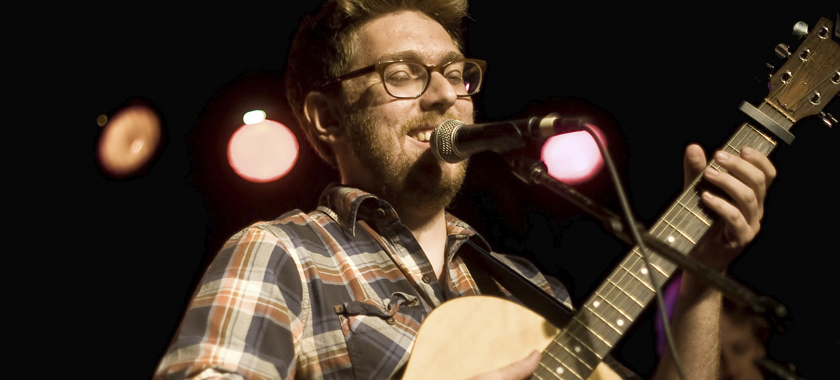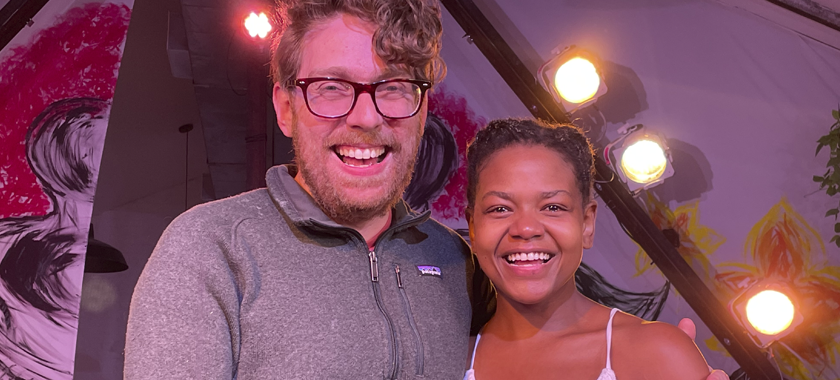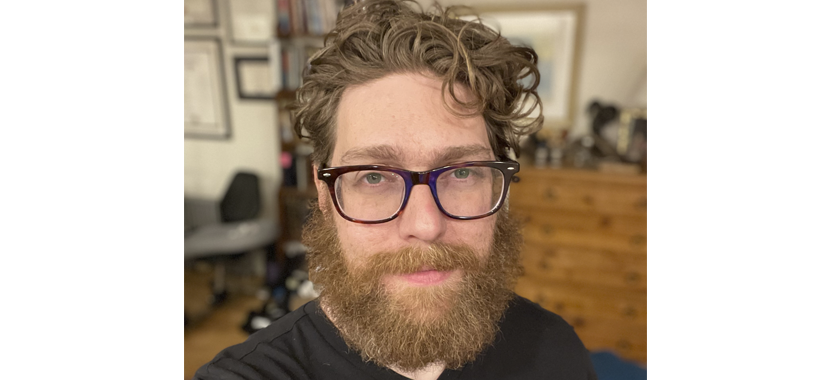
Career Coach and Theater Artist Toby Singer’s Professional Practice Advice for Performing Artists
Our newest NYFA Coach can help you tackle arts career questions big and small, with particular guidance in the wake of the pandemic.
Toby Singer is an arts leader, musician, theater artist, and career coach based in Brooklyn. He’s also the newest addition to NYFA’s Coaching roster, and is available to consult with artists of all disciplines to develop strategic plans and actionable solutions to the big picture questions they face in today’s changing arts ecosystem. Singer specializes in coaching artists in the performing arts—including but not limited to theater artists, musicians, choreographers, and playwrights.
Since 2020, Singer has been a consultant, mentor, and career coach with These Trees Grow: Career Consulting for Artists & Creatives. Previously, Singer was Artistic Director of Super Secret Arts, a Brooklyn theater company.
Get to know Singer below, and consider booking a one-on-one NYFA Coaching session with Singer. Browse all available NYFA Coaching sessions here.
New York Foundation for the Arts (NYFA): You have a deep and multifaceted background in the performing arts. You’ve produced Off-Broadway shows; served as a music and theater director; you sing, tour, record, compose, conduct. While some advice transcends disciplines, some does not. Can you share some professional practices considerations specific to the performing arts (i.e. ticket sales; legal matters; royalties on shows)?
Toby Singer: One: at all costs, find yourself an artistic home where you can workshop your ideas and find a community of like-minded people to support you through the inevitable ups and downs. Being isolated (particularly as a performing artist) has always been a problem, and having our normal performative outlets disrupted like they’ve been for the last couple of years has only made that problem worse.
At all costs, find yourself an artistic home where you can workshop your ideas and find a community of like-minded people to support you through the inevitable ups and downs.
-Toby Singer
Find a theater, or a group of art friends in a living room with a piano, or a residency, or a bar that has a lax policy on what they’ll allow on their stage, or a school, or even a job that allows you some creative outlet—however weird it might be. And to be clear, this can be a virtual or digital community, too.
Two: for performing artists specifically, find a way to archive performative footage as often as you possibly can. For example, when I’m casting for a show, I am drawn to those who showcase their talents in ways that go beyond two or three carefully-curated selections. I’d rather see the song that “didn’t make the cut,” or the weird original that your friend wrote that you’re doing your best to make sound good, or the time you were in a strange musical about dogs, but there was that one reprise that made it worth it. And to be clear, these don’t have to be the height of fidelity, sound or video-wise.
Consider befriending a recording engineer and see if they’d be interested in a couple hours in the studio, whether it’s a cell phone video of the performance (but with that studio quality audio) or a full on demo. Some of my favorite ways to discover something is when a video is clearly just folks in a living room singing something fantastic, and it’s rough, but you get the gist enough. If it makes sense for you, consider utilizing various social media platforms as a performative mode of transmission—but don’t think of it as the only possible way. As artists who specialize in the ephemeral, it is so important to be able to let these creations, however fleeting, live on. And then, when you choose to let something be ephemeral and exist only in that moment, it makes it that much more powerful.
Three: always take the meeting. I’m someone who generally sees the value in connecting with people, regardless of the likelihood of a positive outcome from a careerist angle. It’s good practice, even if you know that the chances of it being anything more than a phone call or a coffee are slim. Also, I see it over and over that a chance encounter that appears to be nothing on the surface bears fruit months, years, or even decades (really!) later. One important exception: if there is a more-than-slight chance of putting yourself at risk of abuse of any kind from this person, don’t take the meeting. Even, and especially even, if there is a high likelihood of a good outcome from a career perspective.
Four: I generally subscribe to the principle that if you’re signing something that relates to your creative practice, have a lawyer review it, even if it seems minor. It doesn’t have to be a lawyer that you pay for; there are a number of legal resources for artists and creatives* that do work pro bono. In particular, it’s good to have a legal resource look over royalties, salaries, and other forms of compensation to make sure they comport with industry standards.
While most contracts and agreements aren’t intentionally malicious, it’s rare that I’ll encounter a contract that doesn’t need at least a tweak here and there, even if it’s just a clarification. It’s better to get it cleaned up before you find yourself a year into a project and trying to navigate around a simple oversight in the language.
And on a related note, when you’re working on a substantial project, always put a collaborator agreement in place as early as you can. Especially when you’re starting out, you’re working with your friends and people you meet informally—we never think these are folks that could put you in a combative situation down the road. But it happens more than you think it does, or want it to happen. And a great way to maintain those friendships past the pressure point is to have some kind of document that guides that process.
*We recommend Volunteer Lawyers for the Arts, which accepts appointments and offers workshops! A fair number of commercial arts oriented firms will also take on pro bono work upon request.

NYFA: When you describe your experience as a coach, a fair portion of it seems like it is helping artists work through a stressful problem. Can you provide a couple of examples of tricky situations that an artist has been in, and how you helped them navigate through it?
TS: Some of that is circumstantial—as we know, timing is everything! I started coaching artists late in 2019, with the goal of helping them navigate fundraising opportunities and crafting strategic plans for their practices. Of course, in March 2020, all of that changed. Instead of fundraising and strategic plans, my coaching was spent engaging with some deeply existential questions that all performing artists were being forced to confront—myself included. Chief among them: When the outlets for your work no longer exist, how do you move forward? In even less words: How does one be an artist in a pandemic?
Much of the work I did that first spring and summer was helping people make sense of the dramatically shifted landscape around them. However, within that context were some situations that might show up at any time, pandemic or not. For instance, I helped a visual artist make a plan for breaking free of her 9-5 job, with the goal of building a freelance art practice that was sustainable financially. This involved an analysis of her particular situation and the possible outlets for both meaningful and remunerative work around her. After a few false starts, I’m happy to say she was successful.
NYFA: How does your work as a practicing theater artist inform your approach to working with artists and creatives?
TS: The process of working with me involves three steps: ideation, consideration, and subsequent action. These first two certainly relate to my work as a practicing artist—one more generally artistic, and one more specifically theatrical. First, ideation. In short, my artist brain never turns off, even if I wanted it to! I find the process of coaching and strategic planning to be intensely creative. I take into account a client’s background, their personality, their resources, and their taste for risk as we spend time dreaming up possibilities. I tend to believe that creativity resists structure, so it’s important for me to create space for a client and I to engage fully in that creative process to initiate next steps.
The process of working with me involves three steps: ideation, consideration, and subsequent action…I take into account a client’s background, their personality, their resources, and their taste for risk as we spend time dreaming up possibilities.
-Toby Singer
Then, consideration. As a music director (and theatrical partner in general), I subscribe to a collaborative approach to art making. I don’t operate in a top-down fashion to make decisions, I want to engage in a back-and-forth that leads to a thoughtful conclusion that then is codified into action. And as a coach (or a music director), I want to support our collectively discerned actionable outcomes through accountability, kindness, and support. It’s true for making great theater, and it’s true for coaching.
NYFA: You’ve been coaching artists for the past two years during and past the height of the pandemic. What are some of the common themes you’ve heard in terms of both goals and challenges?
TS: I spoke about this in the above question a bit, but the common themes I encountered with artists involved the big questions. How does one make art in a moment of societal upheaval? How does one make art when that moment of societal upheaval becomes a season, then a year, then two years, and on? If our artistic practice is centered on joyful engagement with the tools at our disposal, and we’re feeling crushed, sad, and disposable by the world around us, how do we deal with that? And once the initial shock wore off, the most common question revolved around how does one engage with technology as a way to circumvent the limitations that a pandemic puts on us, in terms of limiting in person contact?
Now, as things appear to be getting back to some kind of new normal (or we’re just in the lull between more waves…) the question shifts to how does one re-engage with an artistic practice in a way that takes into account the lessons of the last couple of years? I recommend artists seek to reconnect with their core joy and intention while considering the “why” of how we all came to this type of work, before things spun upside down.
NYFA: In one sentence, what is your top line advice to performing artists and creatives looking to make inroads in their careers?
TS: Strive for joyful patience in building a sustainable career, work to accept that there is much to learn in failure, and more than anything else, be kind to your fellow journeyers, without tolerating abuse.

About Toby Singer:
Toby Singer is an arts leader and working artist in New York City. He most recently was Artistic Director of Super Secret Arts, a Brooklyn theater company and venue based around an innovative membership model that was featured in outlets including American Theatre and WNYC.
Since 2020, Singer has been a consultant, mentor, and career coach with These Trees Grow: Career Consulting for Artists & Creatives, a boutique firm that helps artists of all disciplines to develop strategic plans and actionable solutions to the big picture questions they face in today’s changing arts ecosystem.
Singer has enjoyed a multi-faceted artistic career. A classically trained singer and multi-instrumentalist, Singer spent much of his twenties playing, recording, and touring with indie rock bands, while concurrently working as a synagogue musician and music director. He’s produced, orchestrated, and engineered records and tracks for many artists, with a focus on genre-hopping children’s music.
Singer’s choral arrangements, transcriptions, and compositions are in use in dozens of communities across the country, and have been performed by groups including the Preservation Hall Jazz Band. In New York, he’s been a frequent music director, conductor, and accompanist, as well as a theatrical composer, lyricist, and playwright.
Singer’s theatrical work has been produced in New York Off-Broadway as well as regionally and academically, and his projects have been named critics picks in The New York Times and Time Out. He received his BA degree in Music from the University of Michigan and his MFA degree in Performing Arts Management from Brooklyn College. He lives in Brooklyn with his wife, son, and dog. Learn more about his artistic practice at www.tobysinger.com.
This program is part of NYFA Learning, which includes professional development for artists and arts administrators. Sign up for NYFA’s free bi-weekly newsletter to receive updates on future programs.